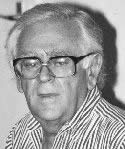Sl
Slovo, Joe (1926-1995)
 Joe Slovo died on 6 January 1995. At the time of his death he held the following positions:
Joe Slovo died on 6 January 1995. At the time of his death he held the following positions:
National Chairperson, South African Communist Party (SACP)
Central Committee and Politburo member, SACP
National Executive Committee member, African National Congress (ANC)
National Working Committee member, ANC
Minister of Housing, Government of National Unity
Despite the propaganda about “the KGB general”, Joe Slovo was not fluent in Russian or Lithuanian. He spoke one language: English.
Born in the village of Obelai, Lithuania on May 23, 1926 to Ann and Woolf Slovo, he had one younger sister, Reina. In the climate of anti-Semitism then rampant in the Baltic states, his family emigrated to South Africa when Slovo was eight. His father worked as a truck driver in Johannesburg.
Slovo attended the Jewish Government School from 1935 to 1937; after that he went to Observatory Junior (1937-39), Yeoville Boys (1939-40) and finally Observatory Junior High School (1940). Here he was influenced by militant Irish teacher, John O'Meara.
His favourite school subject was history; his favourite activities debating and athletics.
Slovo left school after Standard 6 in 1941. He went to work as a dispatch clerk at SA Druggists, joining the National Union of Distributive Workers. As a shopsteward, he was involved in organising a strike. He joined the SACP in 1942.
Influenced by Red Army heroism, he left his surroundings in Doornfontein boarding house and volunteered to fight for the allies in World War II. He later became very active in the Springbok Legion.
Between 1946 and 1950 he completed a BA LLB at Wits. He was politically active as a student, involving himself in all the ’50s campaigns.
In 1949 he married Ruth, the daughter of SACP treasurer Julius First. She was killed by a parcel bomb, believed to have been sent by the apartheid regime to her office in Maputo, Mozambique in 1982.
Both First and Slovo were listed as communists under the Suppression of Communism Act of 1954 and could not be quoted or attend public gatherings in South Africa.
Slovo and First had three daughters – Shawn, Gillian and Robyn. Shawn Slovo’s account of her childhood has been turned into the successful Hollywood movie “A World Apart”.
Slovo was a founder member of the Congress of Democrats. He represented COD on the national consultative committee of the Congress Alliance which drew up the Freedom Charter.
He was arrested and detained for two months during the Treason Trial of 1956. Charges against him were dropped in 1958. He was later arrested for six months during the State of Emergency declared after Sharpeville in 1960.
In 1961, Slovo emerged as one of the leaders of Umkhonto we Sizwe.
In 1963 he went into exile on instructions from the SACP and ANC. He spent his exile years in the UK, Angola, Mozambique and Zambia.
In 1966 he did his LLM at the London School of Economics.
Slovo was based in Mozambique until 1984, when he was elected general secretary of the SACP. At this point he was also MK’s chief of staff and a member of the NEC’s working committee.
Slovo returned to South Africa in 1990 to participate in the early “talks about talks” between the government and the ANC. Following a short period of ill health, he said he would not stand again as SACP general secretary. At the party’s congress in South Africa in December 1991 Slovo was elected SACP chairperson; the late Chris Hani was elected general secretary.
Slovo was a leading theoretician in both the party and the ANC. He wrote numerous articles for the African Communist, of which he was former editor, as well as countless pamphlets. He also contributed to several books such as “No Middle Road”.
Always portrayed as an arch-Stalinist by the former South African government, Slovo surprised his critics with his “Has Socialism Failed?” pamphlet in 1989, acknowledging the weaknesses of socialism and excesses of Stalinism. In 1992 an adapted form of his “Sunset Clause” document, allowing for a form of power sharing with the government, was adopted by the NWC.
Slovo loved classical music, particularly the work of Mahler, and his favourite book was Gogol’s “Dead Souls”. He was married to agricultural economist Helena Dolny and lived in Johannesburg.
[from SACP website]